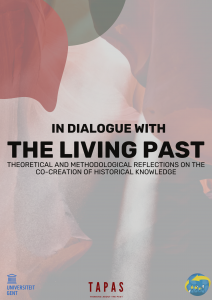
Without question, oral history and ethnographic research are methods that consist of many qualities. They add valuable dimensions to historical research and essentially bring the past ‘alive’ through direct interactions between researchers and their interlocutors. However, these interactions require precaution, discretion, and a sense of responsibility. While anthropologists have been engaging with these research techniques for years, historians are traditionally less familiarized with the pitfalls that undeniably accompany these interactions. That is why, “TAPAS: in Dialogue with the Living Past” aims to delve into this topic.
We want to approach this theme by focusing on three main questions. First, we want to explore who the gatekeepers of historical knowledge production are. What are the different actors in ethnographic research and how are they related to each other? Second, we want to look at how historians can use ethnographic methods in an ethically responsible way. What are effective ways to engage ethically with interlocutors? What are possible methods to research more implicit expressions of historical consciousness in interactions? Is ethnographic research always participatory? How can we set up an atmosphere that makes participants feel safe while allowing researchers to maintain a critical stance? Third, we aim to focus on epistemic authority in ethnographic research. How do we theoretically reflect on and pragmatically approach the positions of ‘expert’ and ‘participant’? Who has the authority to interpret, synthesize and conceptualize? What are the limits of this kind of research? Do we need a framework to divide myth from history? Is it unjust to consciously ignore sensitive topics in research? How can researchers explore the idea of ‘shared authority’ and what forms can it take? What are its benefits, challenges, and boundaries?
During the 2024-2025 academic year, we will be working on this throughout the entire year.
During the first semester (October – December), a reading group series of five thematic sessions will allow us to theoretically reflect on these questions.
On this page, you will find all the information.
In the second semester (February – June), we will take a more hands-on approach in the formula of a workshop series. With a dedicated group, we want to tackle your personal questions and work together on specific ethical, methodological, or other issues that researchers encounter in working with interlocutors.
On this page, you will find all the information.
On May 14, we will organize a small conference in which we can present papers, as well as discuss these issues further.
On this page, you will find all the information.